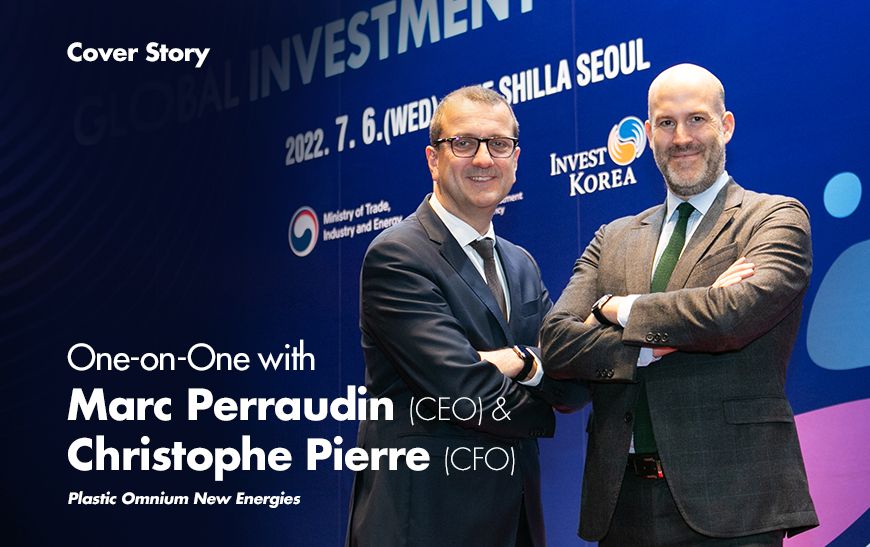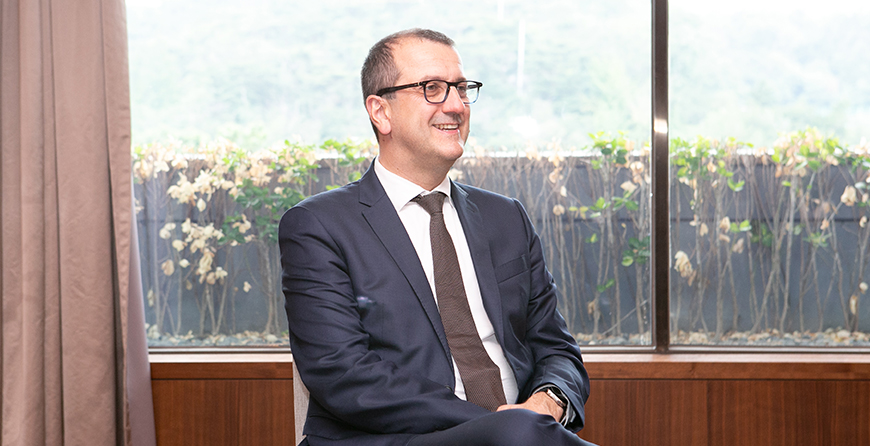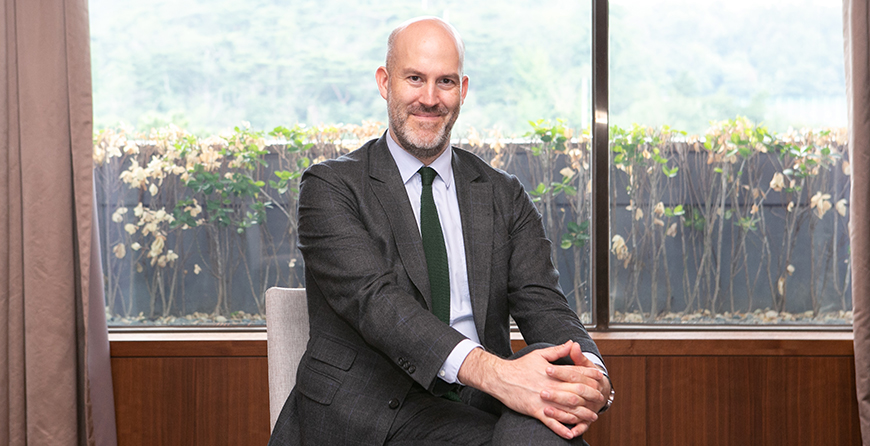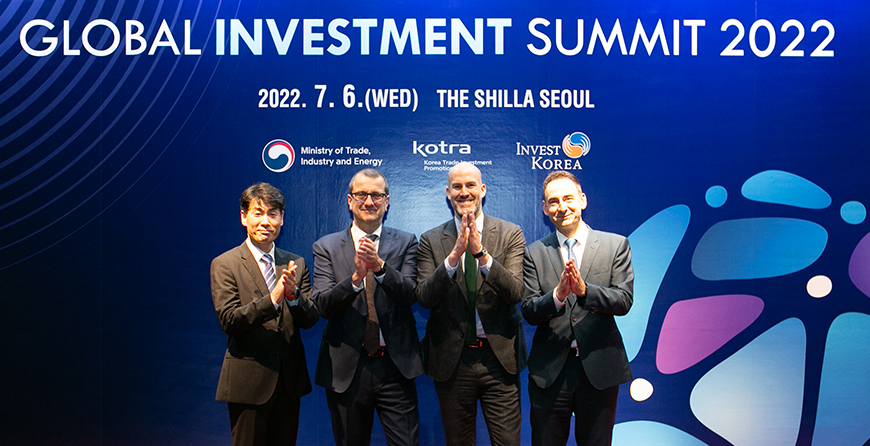
Invest KOREA talks to Marc Perraudin (CEO), Christophe Pierre (CFO) of Plastic Omnium New Energies, to hear more about the company and its operations in Korea.
Invest Korea met with Marc Perraudin (CEO) and Christophe Pierre (CFO) of Plastic Omnium New Energies at the Global Investment Summit 2022 to hear more about the company and its operations in Korea.
Headquartered in France, Plastic Omnium provides innovative solutions for a more connected and sustainable mobility. The Group designs and manufactures complex and interactive body systems as well as emission reduction and energy storage systems for the automotive industry. Founded in 1946, the company today has 137 plants and 31 R&D centers around the world, and relies on its 30,000 employees globally to meet the challenges of clean and smart mobility. The Group established its office in Korea in 1994 in Gyeongju, and recently announced its establishment of a facility in the area.
Invest Korea met with Marc Perraudin (CEO) and Christophe Pierre (CFO) of Plastic Omnium New Energies at the Global Investment Summit 2022 to hear more about the company and its operations in Korea.

Marc: I’m currently the CEO of Plastic Omnium New Energies. This is the business dedicated to hydrogen mobility components. I’ve been working for Plastic Omnium for nearly 50 percent of my life—I’m 52, and I’ve been working for the company for 27 years. I’m originally an engineer, and I’ve experienced different positions in the company, mostly in R&D and business development. Two years ago, I was given the opportunity to run and develop the hydrogen part within the Group, which is a new and emerging product line, but also incredibly promising. This is what brought me to Korea, since Korea is one of the big countries for hydrogen development. We are thrilled to be able to embark on this adventure with our partners here—with the Korean government, Hyundai, and our other customers.
Christophe: I recently joined Plastic Omnium. I’ve worked in the renewable energy business before, so I’m really happy to be working on the hydrogen side of business. Hydrogen poses a great opportunity for the power we can produce and is extremely complimentary with what we can do in terms of renewable energy.
What kind of company is Plastic Omnium, and what is its history?
Marc: Plastic Omnium was established more than 75 years ago and is a family-owned company, which is a very important value for us. It is still controlled by the same family with 60 percent holdings, and the rest of the company is publicly listed on the Paris Stock Market. We are an industrial company, worth roughly 10 billion US dollars in sales, globally involved in numerous product lines. We are also an automotive company, offering battery panels for the car industry and fuel systems as the global leader in these two product lines. A couple years ago, hydrogen was put in the center of our future in terms of development, and this is when we started developing hydrogen storage systems and fuel cell systems for hydrogen mobility.
Additionally, we also are involved in module activity which is important in Korea. We have a joint venture with a Korean company called SL, and we deliver fully assembled front-end modules to Hyundai.
Christophe: In an area where innovation is surging, what Plastic Omnium brings is the capacity to industrialize, which I think is incredibly important. It’s moving from innovative ideas to the capacity to do it on a large scale, which is definitely the place where we can make a difference and be a key player.

Marc: We established a branch in Korea, first to deliver modules to Hyundai and Kia Motors. About 20 years ago, Plastic Omnium acquired a Korean company and became an important player in the automotive industry. We are located in the south of Korea in Gyeongju, and we remain a vital supplier of Hyundai in Ulsan for fuel systems.
Christophe: Korea holds a leading position in the hydrogen industry, so we feel that it’s definitely important to be a part of it and support it.
Marc: Korea has always been in the portfolio for Plastic Omnium’s industrial activities. And now, of course, we are looking to expand into the hydrogen market, and with Hyundai being one of the leaders in the worldwide development of hydrogen technology and cars and taking various initiatives, it was a natural move for us to come to Korea, utilize our teams here, and establish a new facility in the southern region of the country. This was a decision made at the end of 2021, and this is also a reason why we are here today, since we have decided to launch this new investment with the support of KOTRA and the Korean government.
What are some characteristics of Korea’s manufacturing/automobile/energy industries that are helpful for your company in running its business here?
Marc: I think the reputation and establishment of Hyundai Motor Company (HMC) worldwide brings a certain kind of discipline and a lot of expectations. We are learning a lot from them, and I think it’s a very good “school” for those in this industry as they are a global player. The experience that HMC has today in hydrogen mobility and the push that they are bringing to the hydrogen ecosystem is very important and is also paving the way for our success. While following their technical guidance, we are bringing our expertise in components, which ultimately creates a lot of great synergy.
Globally, Korea is a strong leader in industrial manufacturing, making the country a great supply base for us. We will continue to find more local partners and suppliers to establish a strong supply base in Korea in the future and enable ourselves to develop locally.
What are the advantages of doing business in Korea and improvement points for the future?
Marc: I would say, plenty of advantages, specifically because of the industrial footprint and the support you can get from local provinces and government to establish facilities and build. Korea also offers us a very dense network of resources and suppliers.
Like we are seeing all over the world, there is a scarcity of engineers, so the industry, as a whole, needs to really push for foster talent. Korea’s economy is doing well and developing, and would really benefit through nurturing more skilled workers for the future industry.
What kinds of opportunities do global trends like the transition into greener and digital economies, as well as new policy schemes regarding ESG and sustainability offer for your company?
Marc: Essentially, such global trends are what are supporting our activities. Since we are an automotive industrial company at our core, we are surely and progressively evolving in line with the changes in the industry. The current trends pose a fantastic opportunity for us to renew our portfolio of technologies, as well as for the automotive ecosystem to push for a sustainable society and cleaner environment.
ESG is very important to us, especially since we are a family-owned company. Plastic Omnium, about 25 years ago, really pushed hard for safety at the workplace, and now we are globally managing a CSR program called Act for All, which values people development, diversity, product safety and security.
All these trends, which are not only important for industry and automotives but also in terms of society, are motivating the company, our shareholders and the overall development of business and new technologies.

Marc: We rely a lot on KOTRA—they have been very supportive in all our business endeavors.
Gyeongju Province has also been instrumental in the installation of our new facility, and we seek to build a strong network there—a local supplier base and supply chain—especially because we are entering the hydrogen economy which is a new step for us. We will need new types of commodities, new suppliers, and etc.
Christophe: The chambers of commerce are also playing an important role for us—the European Chamber of Commerce (ECCK), French Korean Chamber of Commerce and Industry (FKCCI)—have been helping us out a lot.
Of course, we still have a long way to go in terms of building our own network in the hydrogen industry but our partners here have been very helpful and supportive for us.
What are Plastic Omnium’s future goals for Korea and Asia as a whole?
Marc: Globally, Asia is a primary target for us in terms of hydrogen. Given the combination of Korea’s Hyundai Motors and Japan’s Toyota Motors, who are the two pioneers of hydrogen technology, as well as the strong push from China toward air purification and hydrogen in the mobility industry, Asia makes up a whopping 50 percent of our business in hydrogen down the road by 2030.
So, the Asian region is a key area for us for development, employment, engineering, manufacturing, and this is where we should find most of our customers and applications.
By Grace Park
Executive Consultant
Investment Public Relations Team / Invest Korea
Korea Trade-Investment Promotion Agency (KOTRA)










